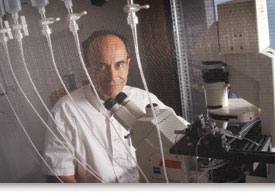The University of Texas Southwestern Medical Center at Dallas
| Long before the implications of a young scientist's work in basic neuroscience were proven, Dallas philanthropists foresaw how it could further the search for new treatments for Alzheimer's and other neurological diseases. Their generous support provided the resources for Dr. Thomas S�dhof, one of the leading neuroscientists in the world, to conduct groundbreaking studies at The University of Texas | 
Dr. Thomas S�dhof
|
| Southwestern Medical Center at Dallas (UT Southwestern) into the mechanism by which neurons communicate in the brain. |
Dr. S�dhof planned to return to his native Germany as a physician-scientist after completing postdoctoral work at UT Southwestern with Nobel laureates Drs. Michael Brown and Joseph Goldstein in 1986. Instead, local philanthropy proved to be vital in keeping him in Texas. "They funded his research at a time when nobody else in the world knew how great he was except for a few people in Dallas," said Dr. Brown, director of the Erik Jonsson Center for Research in Molecular Genetics and Human Disease and co-director, with Dr. Goldstein, of the W.M. Keck Foundation Gene Manipulation Laboratories. Their contributions provided the bedrock Dr. S�dhof needed to set up a laboratory and begin his initial research, which has yielded extraordinary breakthroughs in the field of neuroscience.
In 2001 Dr. S�dhof made a groundbreaking discovery about the role of a protein involved in the onset of Alzheimer's, a finding that may ultimately have a profound impact on how doctors treat the disease. He also has been cited for his discovery of the neurexin-neuroligin system of neuron-specific membrane proteins. This highly diverse family of more than 500 members, each expressed in different cellular regions of the brain, plays a role in establishing specific contacts between different sets of neurons.
In 1997 the National Academy of Sciences named Dr. S�dhof co-recipient of its prestigious Award in Molecular Biology Supported by the Monsanto Company for his study of how information is relayed in the brain. In 2002 he was the only Texan in any field of sciences to be elected to the National Academy of Sciences, one of the highest honors attainable by an American scientist.
"Dr. S�dhof has developed a remarkable career here at UT Southwestern and has been able to accelerate his progress and hasten the development of new treatments for neurological diseases because of the foresight and continuing support of generous citizens and foundations," said Dr. Kern Wildenthal, president of UT Southwestern.
Two recent gifts totaling $7 million will allow Dr. S�dhof to expand his research. A $5 million gift from the Vin and Caren Prothro Foundation and a $2 million gift from the Pauline Allen Gill Foundation will help establish new research at UT Southwestern to help support the work of S�dhof and his team of basic neuroscientists.
During Dr. S�dhof's tenure at UT Southwestern, he has received substantial support from a number of other private foundations, corporations and individuals, including the Cain Foundation, the Gill Foundation, the Perot Foundation, the Sands Foundation and Rosewood Corp., Mr. and Mrs. F. William Barnett Jr., Mr. and Mrs. John P. Harbin, Mr. and Mrs. S.T. Harris, Mr. and Mrs. William S. Montgomery Jr., Mr. and Mrs. Howard Rachofsky, Mr. and Mrs. John W. Rhea Jr., Mr. and Mrs. C.J. Thomsen, Mr. and Mrs. William W. Winspear, Mr. and Mrs. Jos. Irion Worsham, and the Senator John T. Montford Fund, as well as the Howard Hughes Medical Institute, Southwestern Medical Foundation, an anonymous donor, and the National Institutes of Health.
"I am very grateful for all of the philanthropic contributions and for those who visualized the long-range importance of neuroscience research," said Dr. S�dhof, who is an investigator in the Howard Hughes Medical Institute at UT Southwestern and holder of the Gill Distinguished Chair in Neuroscience Research and the Loyd B. Sands Distinguished Chair in Neuroscience. The two chairs are invested in the Long Term Fund and together provide approximately $300,000 annually in support of Dr. S�dhof's work.
"Many neuroscientists throughout the world are using the basic information discovered by Dr. S�dhof to learn how the brain works in normal and disease states," said Dr. Goldstein, chairman of molecular genetics at UT Southwestern.